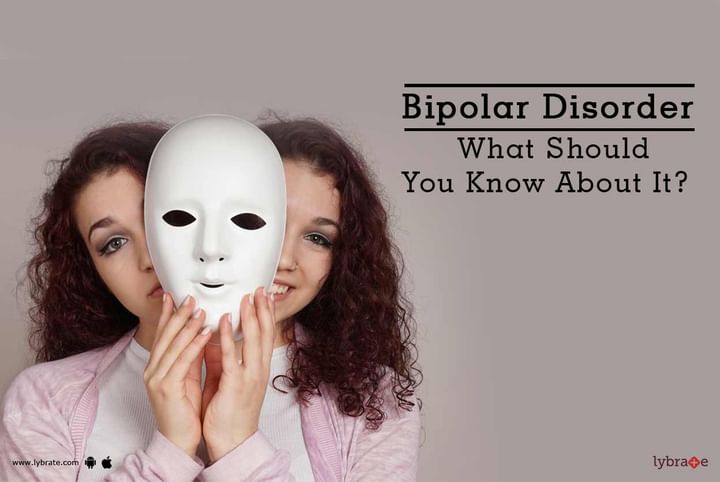Bipolar Disorder - What Should You Know About It?
What is Bipolar Disorder?
Bipolar disorders are brain disorders that cause changes in a person’s mood, energy and ability to function. Bipolar disorder is a category that includes three different conditions - bipolar I, bipolar II and cyclothymic disorder.
People with bipolar disorders have extreme and intense emotional states that occur at distinct times, called mood episodes. These mood episodes are categorized as manic, hypomanic or depressive. People with bipolar disorders generally have periods of normal mood as well. Bipolar disorders can be treated, and people with these illnesses can lead full and productive lives.
Types:
There are three main types of bipolar disorder: bipolar I, bipolar II, and cyclothymia.
-Bipolar I:
Bipolar I is defined by the appearance of at least one manic episode. You may experience hypomanic or major depressive episodes before and after the manic episode. This type of bipolar disorder affects men and women equally.
-Bipolar II:
People with this type of bipolar disorder experience one major depressive episode that lasts at least two weeks. They also have at least one hypomanic episode that lasts about four days. This type of bipolar disorder is thought to be more common in women.
-Cyclothymia:
People with cyclothymia have episodes of hypomania and depression. These symptoms are shorter and less severe than the mania and depression caused by bipolar I or bipolar II disorder. Most people with this condition only experience a month or two at a time where their moods are stable.
Symptoms:
Bipolar symptom in women:
Men and women are diagnosed with bipolar disorder in equal numbers. However, the main symptoms of the disorder may be different between the two genders. In many cases, a woman with bipolar disorder may:
- be diagnosed later in life, in her 20s or 30s
- have milder episodes of mania
- experience more depressive episodes than manic episodes
- have four or more episodes of mania and depression in a year, which is called rapid cycling
- experience other conditions at the same time, including thyroid disease, obesity, anxiety disorders, and migraines
- have a higher lifetime risk of alcohol use disorder
- Women with bipolar disorder may also relapse more often. This is believed to be caused by hormonal changes related to menstruation, pregnancy, or menopause. If you’re a woman and think you may have bipolar disorder, it’s important for you to get the facts. Here’s what you need to know about bipolar disorder in women.
Bipolar system in men:
Men and women both experience common symptoms of bipolar disorder. However, men may experience symptoms differently than women. Men with bipolar disorder may:
- be diagnosed earlier in life
- experience more severe episodes, especially manic episodes
- have substance abuse issues
- act out during manic episodes
- Men with bipolar disorder are less likely than women to seek medical care on their own. They’re also more likely to die by suicide.
Diagnosing bipolar disorder in children is controversial. This is largely because children don’t always display the same bipolar symptoms as adults. Their moods and behaviors may also not follow the standards doctors use to diagnose the disorder in adults.
Many bipolar symptoms that occur in children also overlap with symptoms from a range of other disorders that can occur in children, such as attention deficit hyperactivity disorder (ADHD).
However, in the last few decades, doctors and mental health professionals have come to recognize the condition in children. A diagnosis can help children get treatment, but reaching a diagnosis may take many weeks or months. Your child may need to seek special care from a professional trained to treat children with mental health issues.
Like adults, children with bipolar disorder experience episodes of elevated mood. They can appear very happy and show signs of excitable behavior. These periods are then followed by depression. While all children experience mood changes, changes caused by bipolar disorder are very pronounced. They’re also usually more extreme than a child’s typical mood swing.
Manic symptoms in children
Symptoms of a child’s manic episode caused by bipolar disorder can include:
-acting very silly and feeling overly happy
-talking fast and rapidly changing subjects
-having trouble focusing or concentrating
-doing risky things or experimenting with risky behaviors
-having a very short temper that leads quickly to outbursts of anger
-having trouble sleeping and not feeling tired after sleep loss
-Depressive symptoms in children
Symptoms of a child’s depressive episode caused by bipolar disorder can include:
-moping around or acting very sad
-sleeping too much or too little
-having little energy for normal activities or showing no signs of interest in anything
-complaining about not feeling well, including having frequent headaches or stomachaches
-experiencing feelings of worthlessness or guilt
-eating too little or too much
-thinking about death and possibly suicide
-Other possible diagnoses
Some of the behavior issues you may witness in your child could be the result of another condition. ADHD and other behavior disorders can occur in children with bipolar disorder. Work with your child’s doctor to document your child’s unusual behaviors, which will help lead to a diagnosis.
Bipolar disorder in teens:
Angst-filled behavior is nothing new to the average parent of a teenager. The shifts in hormones, plus the life changes that come with puberty, can make even the most well-behaved teen seem a little upset or overly emotional from time to time. However, some teenage mood swings may be the result of a more serious condition, such as bipolar disorder.
A bipolar disorder diagnosis is most common during the late teens and early adult years. For teenagers, the more common symptoms of a manic episode include:
-being very happy
-“acting out” or misbehaving
-taking part in risky behaviors
-abusing substances
-thinking about sex more than usual
-becoming overly sexual or sexually active
-having trouble sleeping but not showing signs of fatigue or being tired
-having a very short temper
-having trouble staying focused, or being easily distracted
-For teenagers, the more common symptoms of a depressive episode include:
-sleeping a lot or too little
-eating too much or too little
-feeling very sad and showing little excitability
-withdrawing from activities and friends
-thinking about death and suicide
-Diagnosing and treating bipolar disorder can help teens live a healthy life. Learn more about bipolar disorder in teenagers and how to treat it.
Bipolar and depression:
Bipolar disorder can have two extremes: up and down. To be diagnosed with bipolar, you must experience a period of mania or hypomania. People generally feel “up” in this phase of the disorder. When you’re experiencing an “up” mood swing, you may feel highly energized and be easily excitable.
Some people with bipolar disorder will also experience a major depressive episode, or a “down” mood. When you’re experiencing a “down” mood swing, you may feel lethargic, unmotivated, and sad. However, not all people with bipolar disorder who have this symptom feel “down” enough to be labeled depressed. For instance, for some people, once their mania is treated, a normal mood may feel like depression because they enjoyed the “high” caused by the manic episode.
While bipolar disorder can cause you to feel depressed, it’s not the same as the condition called depression. Bipolar disorder can cause highs and lows, but depression causes moods and emotions that are always “down.” Discover the differences between bipolar disorder and depression.
Causes:
Bipolar disorder is a common mental health disorder, but it’s a bit of a mystery to doctors and researchers. It’s not yet clear what causes some people to develop the condition and not others.
Possible causes of bipolar disorder include:
-Genetics
If your parent or sibling has bipolar disorder, you’re more likely than other people to develop the condition (see below). However, it’s important to keep in mind that most people who have bipolar disorder in their family history don’t develop it.
-Your brain
Your brain structure may impact your risk for the disease. Abnormalities in the structure or functions of your brain may increase your risk.
Diagnosis:
A diagnosis of bipolar disorder I involves either one or more manic episodes, or mixed (manic and depressive) episodes. It may also include a major depressive episode, but it may not. A diagnosis of bipolar II involves one or more major depressive episodes and at least one episode of hypomania.
To be diagnosed with a manic episode, you must experience symptoms that last for at least one week or that cause you to be hospitalized. You must experience symptoms almost all day every day during this time. Major depressive episodes, on the other hand, must last for at least two weeks.
Bipolar disorder can be difficult to diagnose because mood swings can vary. It’s even harder to diagnose in children and adolescents. This age group often has greater changes in mood, behavior, and energy levels.
Bipolar disorder often gets worse if it’s left untreated. Episodes may happen more often or become more extreme. But if you receive treatment for your bipolar disorder, it’s possible for you to lead a healthy and productive life. Therefore, diagnosis is very important. See how bipolar disorder is diagnosed.
Role of Homeopathy in Bipolar Disorder:
The first step in our treatment method involves the use of homeopathy. Homeopathy is a system of medicine which stimulates the body to heal itself. When homeopathic medicines are prescribed properly, they work quickly to alleviate symptoms and improve overall health.
Natural remedies for bipolar disorder:
Some natural remedies may be helpful for bipolar disorder. However, it’s important not to use these remedies without first talking with your doctor. These treatments could interfere with medications you’re taking.
The following herbs and supplements may help stabilize your mood and relieve symptoms of bipolar disorder:
Fish oil. A 2013 study shows that people who consume a lot of fish and fish oil are less likely to develop bipolar disease. You can eat more fish to get the oil naturally, or you can take an over-the-counter (OTC) supplement.
- Rhodiola rosea: This research also shows that this plant may be a helpful treatment for moderate depression. It may help treat depressive symptoms of bipolar disorder.
- S-adenosylmethionine (SAMe): SAMe is an amino acid supplement. The research shows it can ease symptoms of major depression and other mood disorders.
Several other minerals and vitamins may also reduce symptoms of bipolar disorder. Here’s 10 alternative treatments for bipolar disorder.



+1.svg)
